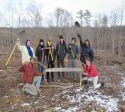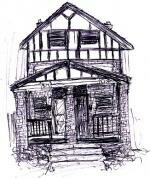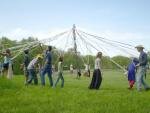The good kind of Groupthink
The classical definition of groupthink includes a type of blindness which occurs when group members try to avoid conflict by selecting solutions not based on what is best for the group, but on what is politically expedient.
But if you think about the etymology of the word, it is clearly ripe for reclaiming. Groupthink could be a new improved type of consensus experience. And it has hive mind applications here on the commune.
For example, when you are on the steam table line to get food and you look at something yummy and you are interested in having seconds. The norm is to wait on second helpings until 6:30 or or 12:30 (for dinner and lunch respectively). This way you can be sure that all the communards who came a bit late got some of the nicer food before it vanishes.
This improved type of groupthink adds another layer of information to this simple rule. Rather than just thinking about yourself and how much food you might like to put on your plate, you do a quick analysis. ”Is there very much of this food, given how many people are behind me and what time it is?” Long before the time for seconds, a good groupthinking member can be aware of their impact on the collective and take food (or other things) accordingly. If there is lots of something on the steam table, feel encouraged to take a large portion, if there is not, then perhaps something more modest is appropriate.
But food is just one example. There are lots of ways to think more collectively here and some of these include being a caretaker for spaces that you use. Purl recently rescued a who collection of furniture from some students who were leaving it behind. The warehouse had couches and desks and even a couple of podiums in it. These we distributed using our “Flips” system.

An example of a flips list
When this furniture came in there were flips list put on them and anyone who was interested in acquiring these items could sign their name on it and then after some pre-announced time the lists are carefully torn up, the names put in a hat and some lucky winner is drawn.
The improved groupthink piece here is that when you are looking at an item you need to think bigger than “would this be good in my room?”. We are best served collectively if members think about all our various spaces and where these new free treasures might be best placed. In a living room, or the compost cafe or some other public space.
When we are on top of it, collective living expands our thinking from a self-focused orientation to “what is best for us?”
- Paxus's blog
- Login to post comments
- Feed: Paxus Blog
- Original article








